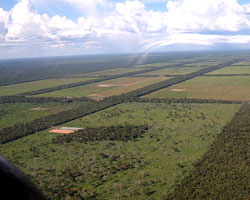The Year of Record Emissions

Climate change comes from human activities—particularly the burning of fossil fuels, deforestation and destructive farming methods—that make thicker the blanket of greenhouse gases like carbon dioxide (CO2) that surrounds the earth. By trapping in heat, this blanket increases global temperatures, prompting species extinctions, disruptions in food and water supplies, a rise in sea levels, more frequent and fierce storms and extreme weather such as droughts, heavy precipitation and heat waves.
Despite the attention climate change has received in recent years, CO2 emissions have never been higher. According to a report issued by the International Energy Agency (IEA) last week, more greenhouse gases were released in 2010 than ever before.
“Energy-related carbon-dioxide emissions in 2010 were the highest in history,” the Paris-based IEA said in a statement posted on its website.
The IEA’s report could affect the United Nations Framework Convention on Climate Change (UNFCC) discussions, taking place from June 6-17 in Bonn, Germany. At the convention, 192 countries are developing strategies to combat global warming by setting goals to increase renewable energy use, reduce emissions and expand forests. The panels will also discuss building safer, stronger buildings and flood walls in communities that are especially vulnerable to climate change.
Since the ultimate goal of the convention is to stabilize greenhouse gas concentrations “at a level that would prevent dangerous anthropogenic (human induced) interference with the climate system,” drastic action is needed quickly. The IEA cautions that average global temperatures should not increase by more than 2.0°C (3.6°F), which means that the rise in emissions over the next decade must be less than the increase we saw between 2009 and 2010.
“Our latest estimates are another wake-up call,” said IEA chief economist Fatih Birol. “The world has edged incredibly close to the level of emission that should not be reached until 2020 if the 2.0°C (3.6°F) target is to be attained.”
Current pledges to cut greenhouse gas emissions would achieve only 60% of what scientists say is needed to hold global emissions to 2°C. Al Gore noted in 2008 (the year behind 2010 in record CO2 emissions) that we need to change more than just light bulbs. “It is far more important to change the laws and to change the treaty obligations that nations have,” Gore said. “This issue is going to be dealt with responsibly and effectively only when there is a sufficient degree of urgency on the part of the people themselves.”
About three-quarters of the energy emissions increase in 2010 came from rapidly developing nations like China and India, said the IEA, but it’s the least-developed countries and small island states that are left to suffer the immediate consequences. Many of these undeveloped nations were promised funding from industrialized nations to help them adapt to climate change, but most of that money has not materialized.
“We can expect only around 30% of what has been promised by next year. It is very frustrating,” said Quamrul Chowdhury, a lead negotiator with the least developed countries in Bonn. Developed countries are also looking to this week’s discussions to help renew the Kyoto Protocol in 2012, which is the only legally binding agreement compelling wealthy nations to cut emissions (and which the U.S. has refused to sign).
“After nearly two decades of negotiations designed to limit the carbon pollution responsible for dangerously warming the planet, we instead have watched global emissions steadily climb to the highest level on record,” said Cape Verde’s ambassador to the UN, Antonio Lima.
While nations across the globe negotiate the future of the world climate, the UNFCC website states optimistically that “teamwork and political will can slow the rate of global warming and help the world cope with the climate shifts that occur.” It concludes that “global warming is a modern problem—complicated, involving the entire world, tangled up with difficult issues such as poverty, economic development and population growth. Dealing with it will not be easy. Ignoring it will be worse.”

